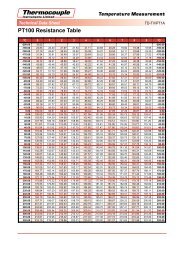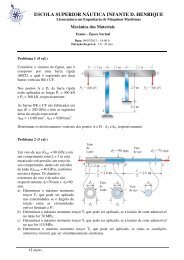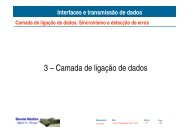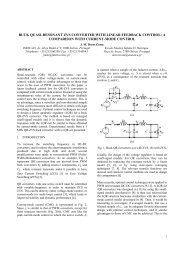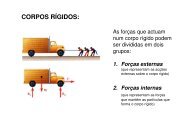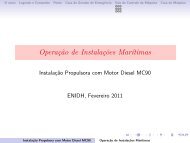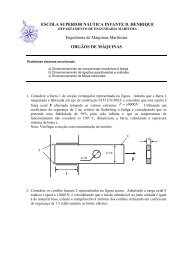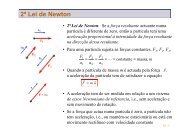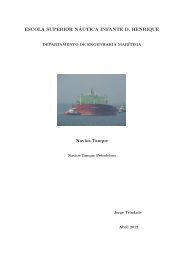Textos de Apoio (pdf)
Textos de Apoio (pdf)
Textos de Apoio (pdf)
Create successful ePaper yourself
Turn your PDF publications into a flip-book with our unique Google optimized e-Paper software.
ITTC –Recommen<strong>de</strong>d<br />
Procedures<br />
Full Scale Measurements<br />
Speed and Power Trials<br />
Trial Conditions<br />
7.5 – 0.4<br />
01 – 01.5<br />
Page 2 of 6<br />
Effective Date<br />
2002<br />
Revision<br />
01<br />
Trial Conditions<br />
1. PURPOSE<br />
The purpose of this procedure is to establish<br />
gui<strong>de</strong>lines for the <strong>de</strong>finition of acceptable<br />
limits for trial conditions nee<strong>de</strong>d to validate<br />
hydrodynamic <strong>de</strong>sign and/or satisfy contractual<br />
requirements.<br />
b. Collect and record seawater temperature<br />
and specific gravity during trial,<br />
daily.<br />
4. DEFINITIONS<br />
None<br />
2. SCOPE<br />
This procedure applies to the documentation<br />
of trial conditions (environmental and<br />
ship) in which the full-scale Speed/Power trial<br />
are performed.<br />
3. RESPONSIBILITIES<br />
• The Trial Director is the duly authorized<br />
shipbuil<strong>de</strong>r’s representative responsible for<br />
the execution of all phases of the<br />
Speed/Power trials. When unforeseen problems,<br />
such as weather or technical difficulties<br />
require that the trial schedule or trial<br />
logistics be modified, the Trial Director<br />
shall make the final <strong>de</strong>cision, subject to the<br />
concurrence of the ship’s master and the<br />
owner’s representative.<br />
• The shipbuil<strong>de</strong>r is responsible for the overall<br />
trial coordination between the ship's<br />
crew, trial personnel, and the owner representative.<br />
A pre-trial meeting between the<br />
trial team, owner and the ship’s crew will<br />
be held to discuss the various trial events<br />
and to resolve any outstanding issues.<br />
• The trial team is responsible for the following:<br />
a. Operate and maintain all required trial<br />
instrumentation and temporary cabling.<br />
5. PROCEDURE<br />
1. Speed/Power trials require accurate position<br />
data and therefore will i<strong>de</strong>ally be conducted<br />
at an instrumented tracking range<br />
located in a sheltered body of water. Lacking<br />
availability of an instrumented tracking<br />
range, the use of DGPS provi<strong>de</strong>s great latitu<strong>de</strong><br />
in choosing a trial site. Regardless of<br />
the instrumentation utilized for obtaining<br />
positional data, the operational area should<br />
be free from substantial small boat traffic.<br />
2. If an instrumented tracking range is utilized,<br />
the ship’s master will receive a formal<br />
briefing on tracking range procedures by<br />
the Trial Director prior to the conduct of<br />
the trials. During the briefing, specific trial<br />
runs will be reviewed. The trial team will<br />
provi<strong>de</strong> an on-shore observer to monitor<br />
data collection by the tracking range facility.<br />
If DGPS is utilized, the Trial Director<br />
will brief the ship’s master on specific trial<br />
runs and procedures.<br />
3. Ship characteristics and environmental factors<br />
are carefully monitored and documented<br />
throughout the trials (see Table 1).<br />
Accurate quantification of these conditions<br />
is necessary because a ship's speed and<br />
powering characteristics are extremely sensitive<br />
to conditions such as ship and propeller<br />
condition, ship displacement, shallow<br />
water effects, sea state and wind velocity.


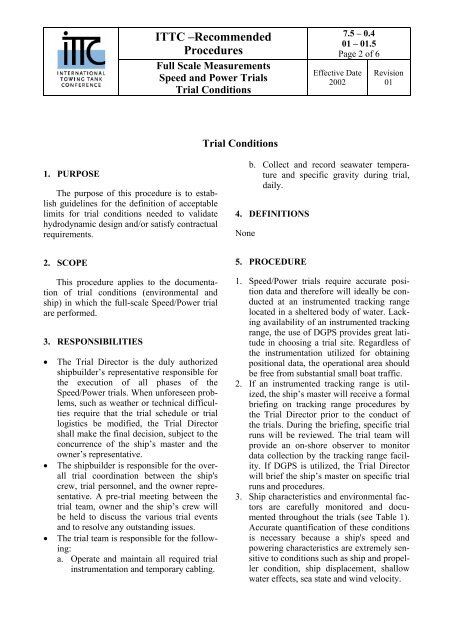
![Conceitos transmissao de dados .Sinais[.pdf]](https://img.yumpu.com/50982145/1/190x146/conceitos-transmissao-de-dados-sinaispdf.jpg?quality=85)
![Packages e interfaces[.pdf]](https://img.yumpu.com/50629553/1/190x134/packages-e-interfacespdf.jpg?quality=85)
